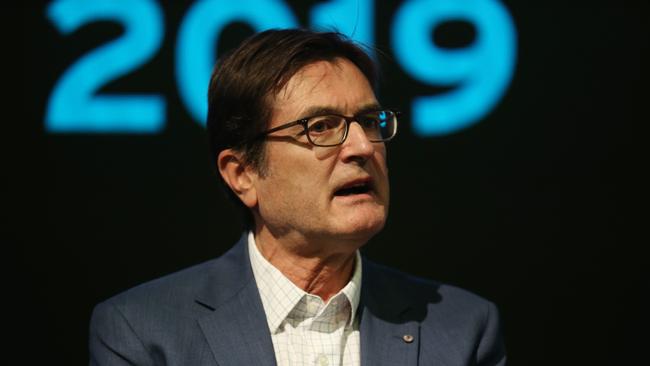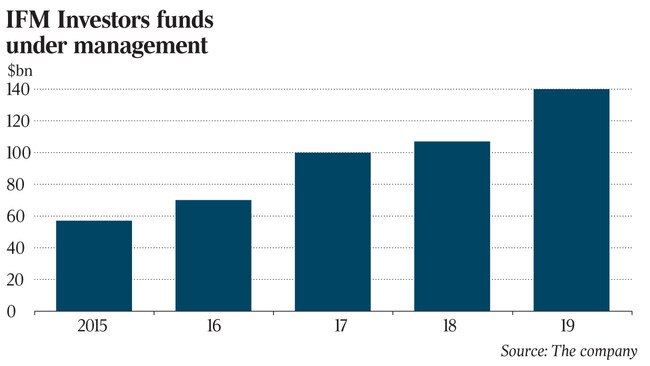Super funds to splurge $28bn on infrastructure
The nation’s industry superannuation funds are ready to deploy more than $28bn to worthy infrastructure and property projects.

The nation’s industry superannuation funds are ready to deploy more than $28bn to worthy infrastructure and property projects as the economy starts to emerge from COVID-19 lockdown.
Ahead of Industry Super Australia’s appearance before the House economics committee on Thursday, ISA chair Greg Combet said partnerships with state and federal governments backed by stable policy settings could mean the nest egg was “just the start”.
“We’ve got sufficient funds available and plans to provide capital to solid Australian businesses and bring forward large investments in major projects and essential infrastructure that will create new jobs and sustain many more,” Mr Combet told The Australian.
“We’re determined to play a key role in helping Australia’s economic rebuild, because that gets some members working again and delivers long-term returns for all.”
Mr Combet, a former federal Labor minister, pointed to a number of major projects that the industry funds were prepared to back, including the proposed multi-billion-dollar fast rail link between Southern Cross station in the Melbourne CBD and Tullamarine airport.
The project, he said, was well advanced in planning and engineering, and “needs to go ahead”.
Brisbane Airport’s new $1.3bn runway, which is Australia’s biggest aviation project and scheduled for completion this year, was another example.
ISA chief executive Bernie Dean and his deputy Matt Linden will represent the group before the economics committee, which is chaired by Liberal MP Tim Wilson.
ME Bank, which is owned by 26 industry funds, will appear after ISA.
The bank has recently been embroiled in a controversy over changes to redraw facilities for home loan customers.
Chief executive Jamie McPhee apologised last week, saying the bank’s priority was to fix the situation and regain the trust of its customers.
“We can and will do better,” Mr McPhee said.
He rejected any suggestion of an ulterior motive, saying the bank was in a strong financial position.

Mr Combet’s assertion that the industry funds are ready to play a key role in the nation’s economic recovery follows his critique of the government’s decision to enable super fund members to withdraw up to $20,000 in cases of financial hardship due to the pandemic.
The new rules allow workers to take out $10,000 in savings before June 30, and a further $10,000 between July 1 and September 24.
Both payments are tax-free.
Ahead of the economics committee hearings, Mr Wilson said it “perplexed” him that representatives of funds were using members’ money to tell members not to exercise their free choice to draw down money in an emergency.
“And then, when they’re asked to reveal the assumptions behind their advertising campaign, they adjust them,” he said.
“Something’s just not right and it needs to be explored.”
In an oped published in The Australian last month, Mr Combet said the early access scheme “punched a hole” in bipartisan policy which preserved super savings until retirement.
“All of these events place pressure on the liquidity of the super funds,” he said.
“But let me be blunt: the industry super funds are effectively managing these liquidity pressures.”
Mr Combet also said it was in everyone’s interest that a suggestion by businessman Tony Shepherd to suspend super guarantee contributions went no further.
He warned that more policy-induced liquidity pressure would restrict the amount of capital available to invest in the future.
“Maintaining stability in policy settings for superannuation will be critical for the economy as we emerge from the pandemic, and that means it’s critical for members,” he said.
The industry funds — which have $700bn in assets under management, of which $80bn is invested in local infrastructure, property and other assets — have borne the brunt of the early super access initiative, accounting for $6bn of the $10bn in total industry withdrawals.
Mr Combet pointed to their role in “pumping hundreds of millions of dollars” into the recent round of capital raisings by ASX-listed companies, such as National Australia Bank, Reece Plumbing and Ramsay Healthcare.
The funds, he said, owned an average of 10 per cent of listed companies, and had provided a significant part of the $120bn in capital raised by companies by the end of the global financial crisis.
‘We are meeting the liquidity needs of the listed sector,” the ISA chair said.
The funds also supported technology start-ups, small and medium-sized enterprises, social housing and aged care, in addition to providing finance to the major banks.
ISA said on Wednesday that its members’ capital expenditure on infrastructure created or supported 46,000 jobs in one year.



To join the conversation, please log in. Don't have an account? Register
Join the conversation, you are commenting as Logout